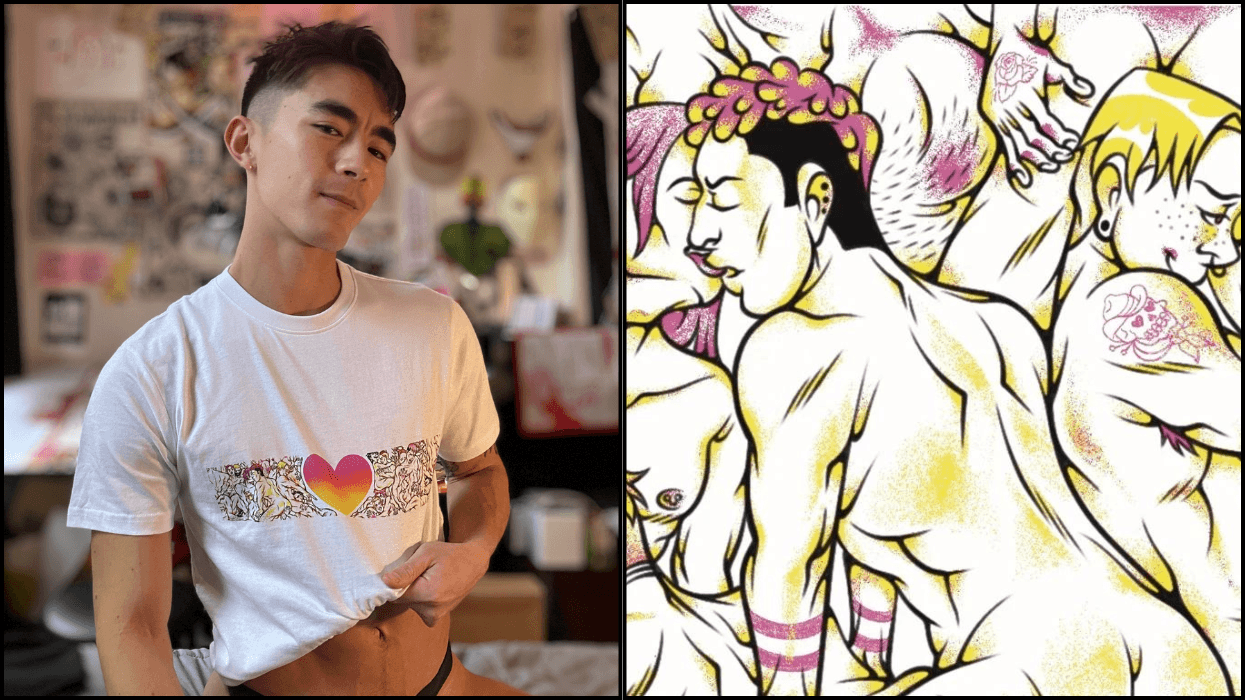
The outgoing head of the National Gay and Lesbian Task Force mixed liberal activism with gay rights -- but to what end?
February 05 2008 12:00 AM EST
November 17 2015 5:28 AM EST
By continuing to use our site, you agree to our Private Policy and Terms of Use.

The outgoing head of the National Gay and Lesbian Task Force mixed liberal activism with gay rights -- but to what end?
Matt Foreman, who announced January 23 that he would be resigning as executive director of the National Gay and Lesbian Task Force, was many things during his five years at the top of one of the country's preeminent gay rights organizations. He was an outspoken opponent of the war in Iraq. He fought against privatizing Social Security. He stood foursquare against the erosion of abortion rights.
But what any of these issues have to do with lobbying for gay rights -- presumably Foreman's job description -- is beyond me.
His job description, though, was the problem. Foreman, after all, is just a symptom of the larger problem with NGLTF: It's a garden-variety liberal interest group posing as a gay rights organization. In its mission statement, NGLTF defines itself as forming "part of a broader social justice movement," meaning that it seeks alliances with an array of left-wing groups, from labor unions to pro-choice organizations. Its worldview -- which will be on display at its annual Creating Change conference in Detroit starting February 7 -- is formed by a combination of academic "queer theory" and Marxist rhetoric about "systems of oppression." According to this outlook, the United States -- and Western, liberal capitalist societies in general -- are predicated on "oppressing" the poor, nonwhites, "queers," and everyone else who isn't a white male. So the battle for gay rights suddenly becomes part and parcel of the battle to redistribute wealth, weaken American sovereignty by making the United States subservient to the whims of the United Nations, and mandating racial quotas. In this vision of the world, the fight for gay rights is inseparable from the campaign to, say, oppose welfare reform.
There is, of course, nothing inconsistent with being gay and liberal -- the same can be said of being gay and conservative, but that's a point neither NGLTF nor its ideological allies would ever concede -- yet the group's crucial error is the conflation of liberalism with the very notion of gay rights itself. There are two problems with this approach. First, it renders conservatism and gay rights mutually exclusive, which is false and divisive. There are plenty of elected Republicans in this country -- even at the federal level -- who are supportive of gay rights while holding conservative viewpoints on taxes, foreign policy, and social programs. They should be embraced by gay rights groups, not scorned, especially at a time when antigay sentiment is receding in the GOP.
The second error of merging gay rights activism with left-wing politics is that it lets liberals off the hook when they fail to stand up for their purported belief in gay equality. With the Defense of Marriage Act, "don't ask, don't tell," and bar on HIV-positive people from entering the country, the Clinton administration was responsible for more antigay legislation than President George W. Bush, yet Bill and Hillary get applauded whenever they speak before a gay audience.
None of this is to say that gay activists should not be politically active -- far from it. The Stonewall Democrats work to ensure that the Democratic Party supports gay rights, and the Log Cabin Republicans do the same within the Republican Party. Both groups make no pretensions, however, to speak for all of the country's gays, instead claiming correctly that they represent gay Democrats and gay Republicans respectively. Meanwhile, NGLTF peddles a pernicious discourse purporting that the gay people who oppose their agenda are rich white men suffering from false consciousness.
In 2004 about 25% of self-described gay voters supported Bush for president (the actual number is likely higher, given the fact that many gay people probably don't feel comfortable identifying themselves as such to a pollster). That's an astonishingly high number considering that this was after Bush had come out in support of the Federal Marriage Amendment. Accordingly, one can conclude that a substantial number of gays are not liberal, nor are they single-issue voters. Many gays are willing to support candidates who do not support same-sex marriage but who nevertheless better reflect their views on most other issues ranging from taxes to national defense.
Perhaps none of this should matter in light of NGLTF's important work on neglected issues like homelessness among gay youths. But take same-sex marriage, perhaps the foremost issue in the gay rights struggle. NGLTF and its like-minded allies on the "queer" left only came around to support it fairly recently, after spending decades complaining that marriage perpetrated oppressive gender norms and that gays should not buy into such a "heteronormative" institution. Yet even as NGLTF has officially come out in support of gay marriage, the organization's communications coordinator, several past and present board members, and the founding director of its policy institute are signatories to "Beyond Same-Sex Marriage," a radical document of which NGLTF's "senior strategist" is a coauthor. Such a text plays to the worst fears of antigay right-wingers in that it decries the very notion of marriage altogether as a "patriarchal" institution. On one of the most important issues facing gay people today, NGLTF's intellectual leadership isn't just behind the curve -- it's on the wrong side.
Marriage isn't the only issue where NGLTF actively hurts gay equality; Foreman played a harmful role during the recent legislative battle over the most significant gay rights legislation to come before Congress in years. Last fall Foreman spearheaded efforts to oppose Congressman Barney Frank and House speaker Nancy Pelosi's efforts to pass the Employment Non-Discrimination Act, a bill that would make it illegal to fire people because of their sexual orientation. Outraged that ENDA did not include a transgender provision (which would have rendered the bill dead on arrival), Foreman gathered together a dubious group of some 300 "organizations," the vast majority of them statewide or local, many too obscure to genuinely claim to represent the interests of gay people, to oppose the Human Rights Campaign's careful strategy to work the bill through Congress. Because of Foreman's histrionics, liberal legislators with 100% pro-gay voting records found themselves slandered as reactionary sell-outs for supporting a historic gay rights bill that did not include a minuscule portion of the so-called "community."
Thankfully, there is no shortage of organizations that devote their work exclusively to the cause of gay equality. From the Human Rights Campaign to the Gill Action Fund to the Servicemembers Legal Defense Network, these worthwhile groups do not waste their time advocating for causes that have absolutely nothing to do with gay rights, support for which rarely redounds in reciprocal backing for gay causes. And while Foreman no doubt increased NGLTF's budget -- draining money from groups that actually have a track record of accomplishment -- it's unclear what, if anything, he accomplished for gay people during his five-year tenure. His parting shot to defeat ENDA is but the latest reminder that NGLTF is redundant at best and counterproductive at worst.
Want more breaking equality news & trending entertainment stories?
Check out our NEW 24/7 streaming service: the Advocate Channel!
Download the Advocate Channel App for your mobile phone and your favorite streaming device!

